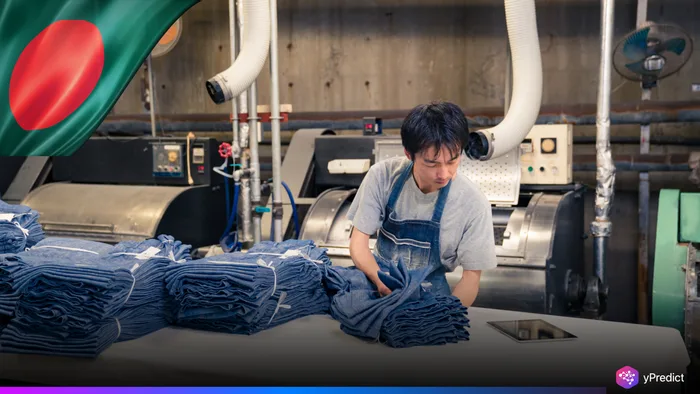
The Bangladesh garment industry, a global production powerhouse and the backbone of the nation’s economy, is facing a looming crisis. Millions of factory workers, especially women, now live in fear as new U.S. trade restrictions cast a shadow over their future. With 4 million workers dependent on this sector and exports accounting for over 80% of Bangladesh’s earnings, even a slight shift in global trade policy sends ripples across the nation.
A 35% tariff recently announced by U.S. President Donald Trump is set to take effect from August 1. While slightly lower than the previously threatened 37%, this new tariff is still more than double the existing average. It directly impacts Bangladesh’s most vital export industry, clothing, and apparel, and has already caused panic among workers and factory owners alike. The concern is not just economic, it’s deeply personal for those who rely on these jobs to survive.
Workers Fear Job Losses as Orders Decline
In Ashulia, the booming garment hub located east of Dhaka, workers like 32-year-old Raimoni Bala are making garments while balancing anxiety in their hands and nerves. “I worry every day about losing my job,” she said. “Whenever someone announces they are coming to the factory, my heart feels heavy. I always think that they came to tell me that I will no longer be needed.” Bala said this, trying to hold back tears as she described the constant anxiety she faces as part of her daily life. Like so many, her income supports her children’s education and provides necessities.
It is getting worse. Factory owners say buyers from all over the world, like Nike to VF Corp, are in a “wait-and-see” position and have been laying low. They stopped placing new orders out of fear of the inflated prices they would now face because of the U.S. tariffs; this resulted in lighter workloads, yet later pay periods, and increased anxiety for the labor force.
Trade Talks Offer Hope, But Time Is Running Out
Bangladesh’s government has announced that a second round of trade talks with the U.S. Trade Representative will commence, and officials are optimistic an agreement can be reached, but time is running out. Brands are starting to look to Vietnam, which has a 20% tariff yet is a viable option, as well as India and Sri Lanka which are expected to have slightly better treatment.
According to the experts, if these talks fall through or take too long, Bangladesh’s market share can easily decline. “These cost increases will ultimately burden the garment manufacturers, and millions of workers they employ, most of whom are women. Something must be done now because the combination of layoffs and inflation can drive many more families into poverty”, said Selim Raihan, an economics professor at the University of Dhaka.
Lives and Dreams Hinge on the Stitching Line
For workers like Bala, the job is more than just a paycheck. It’s hope. Her husband can only work occasionally due to health issues, so her income supports their family. During the pandemic, her factory shut down temporarily. The government’s support helped, but it was barely enough. Today, every rumor of a factory closing or tariff hike brings that same fear back.
Still, Bala keeps going. “I have confidence in my work. I work with respect,” she said. “As long as I have this job, my sons can dream. Without it, I don’t know what will happen to us.” Her words reflect a truth shared by millions across Bangladesh, that jobs in the garment industry aren’t just employment, they’re lifelines.
Can Bangladesh Protect Its Garment Workers from Trade Shocks?
The Bangladesh apparel industry stands at a critical crossroads. Unless the country can quickly secure a solid trade deal, factories may close, orders may be canceled and intensified competition from around the world may lead to mass unemployment. Currently, we are focusing on rapid campaigning and increasingly robust local policies to protect workers’ incomes.
The global fashion industry has a role to play, too. Brands should consider the human costs of trade decisions, not just the margin. For workers in Bangladesh, each stitch is a struggle for tomorrow.







